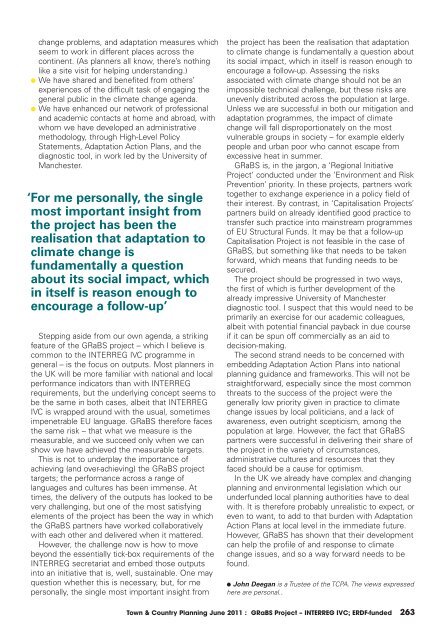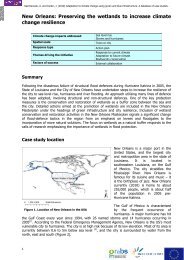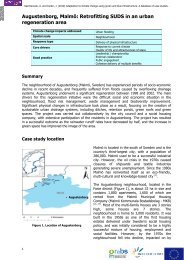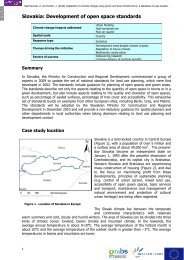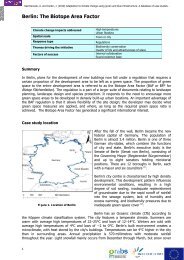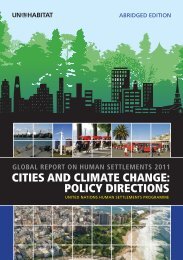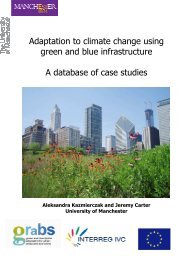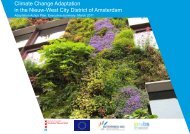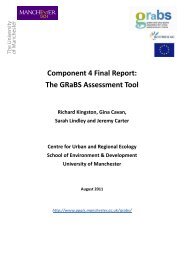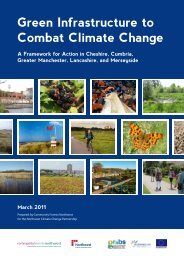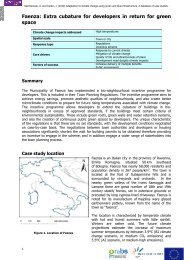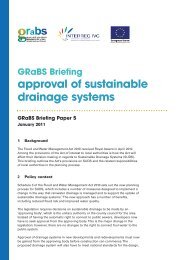Download - GRaBS
Download - GRaBS
Download - GRaBS
You also want an ePaper? Increase the reach of your titles
YUMPU automatically turns print PDFs into web optimized ePapers that Google loves.
change problems, and adaptation measures which<br />
seem to work in different places across the<br />
continent. (As planners all know, there’s nothing<br />
like a site visit for helping understanding.)<br />
● We have shared and benefited from others’<br />
experiences of the difficult task of engaging the<br />
general public in the climate change agenda.<br />
● We have enhanced our network of professional<br />
and academic contacts at home and abroad, with<br />
whom we have developed an administrative<br />
methodology, through High-Level Policy<br />
Statements, Adaptation Action Plans, and the<br />
diagnostic tool, in work led by the University of<br />
Manchester.<br />
‘For me personally, the single<br />
most important insight from<br />
the project has been the<br />
realisation that adaptation to<br />
climate change is<br />
fundamentally a question<br />
about its social impact, which<br />
in itself is reason enough to<br />
encourage a follow-up’<br />
Stepping aside from our own agenda, a striking<br />
feature of the <strong>GRaBS</strong> project – which I believe is<br />
common to the INTERREG IVC programme in<br />
general – is the focus on outputs. Most planners in<br />
the UK will be more familiar with national and local<br />
performance indicators than with INTERREG<br />
requirements, but the underlying concept seems to<br />
be the same in both cases, albeit that INTERREG<br />
IVC is wrapped around with the usual, sometimes<br />
impenetrable EU language. <strong>GRaBS</strong> therefore faces<br />
the same risk – that what we measure is the<br />
measurable, and we succeed only when we can<br />
show we have achieved the measurable targets.<br />
This is not to underplay the importance of<br />
achieving (and over-achieving) the <strong>GRaBS</strong> project<br />
targets; the performance across a range of<br />
languages and cultures has been immense. At<br />
times, the delivery of the outputs has looked to be<br />
very challenging, but one of the most satisfying<br />
elements of the project has been the way in which<br />
the <strong>GRaBS</strong> partners have worked collaboratively<br />
with each other and delivered when it mattered.<br />
However, the challenge now is how to move<br />
beyond the essentially tick-box requirements of the<br />
INTERREG secretariat and embed those outputs<br />
into an initiative that is, well, sustainable. One may<br />
question whether this is necessary, but, for me<br />
personally, the single most important insight from<br />
the project has been the realisation that adaptation<br />
to climate change is fundamentally a question about<br />
its social impact, which in itself is reason enough to<br />
encourage a follow-up. Assessing the risks<br />
associated with climate change should not be an<br />
impossible technical challenge, but these risks are<br />
unevenly distributed across the population at large.<br />
Unless we are successful in both our mitigation and<br />
adaptation programmes, the impact of climate<br />
change will fall disproportionately on the most<br />
vulnerable groups in society – for example elderly<br />
people and urban poor who cannot escape from<br />
excessive heat in summer.<br />
<strong>GRaBS</strong> is, in the jargon, a ‘Regional Initiative<br />
Project’ conducted under the ‘Environment and Risk<br />
Prevention’ priority. In these projects, partners work<br />
together to exchange experience in a policy field of<br />
their interest. By contrast, in ‘Capitalisation Projects’<br />
partners build on already identified good practice to<br />
transfer such practice into mainstream programmes<br />
of EU Structural Funds. It may be that a follow-up<br />
Capitalisation Project is not feasible in the case of<br />
<strong>GRaBS</strong>, but something like that needs to be taken<br />
forward, which means that funding needs to be<br />
secured.<br />
The project should be progressed in two ways,<br />
the first of which is further development of the<br />
already impressive University of Manchester<br />
diagnostic tool. I suspect that this would need to be<br />
primarily an exercise for our academic colleagues,<br />
albeit with potential financial payback in due course<br />
if it can be spun off commercially as an aid to<br />
decision-making.<br />
The second strand needs to be concerned with<br />
embedding Adaptation Action Plans into national<br />
planning guidance and frameworks. This will not be<br />
straightforward, especially since the most common<br />
threats to the success of the project were the<br />
generally low priority given in practice to climate<br />
change issues by local politicians, and a lack of<br />
awareness, even outright scepticism, among the<br />
population at large. However, the fact that <strong>GRaBS</strong><br />
partners were successful in delivering their share of<br />
the project in the variety of circumstances,<br />
administrative cultures and resources that they<br />
faced should be a cause for optimism.<br />
In the UK we already have complex and changing<br />
planning and environmental legislation which our<br />
underfunded local planning authorities have to deal<br />
with. It is therefore probably unrealistic to expect, or<br />
even to want, to add to that burden with Adaptation<br />
Action Plans at local level in the immediate future.<br />
However, <strong>GRaBS</strong> has shown that their development<br />
can help the profile of and response to climate<br />
change issues, and so a way forward needs to be<br />
found.<br />
● John Deegan is a Trustee of the TCPA. The views expressed<br />
here are personal..<br />
Town & Country Planning June 2011 : <strong>GRaBS</strong> Project – INTERREG IVC; ERDF-funded 263


